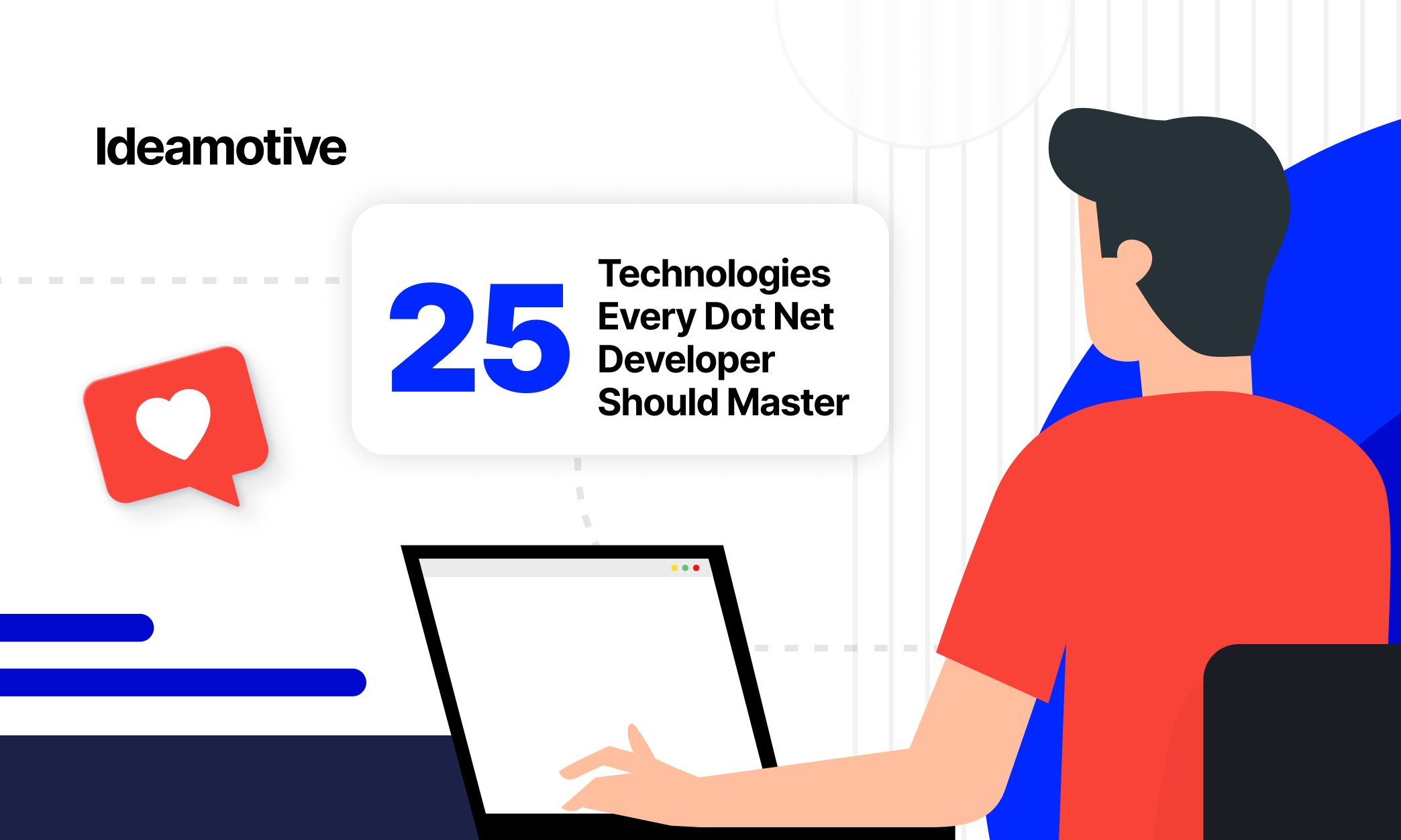Before you decide to use .NET for your project, you need to learn what skills and traits make the great .NET developer.
We will start with some basic .NET information and then move on to three types of skills. Those crucial for .NET developers, more universal technical skills, and finally, soft skills helpful in a developer's career.
Mastering these 25 skills and technologies will make you the most sought for .NET developer on the market. On the other hand, if you're looking for a specialist for hire, this article is handy to support suggesting what skills to look for.
What is .NET? What's that for?
Microsoft's .NET Framework was a direct response to the popularity of the Java platform. It first came in 2002 and it was meant for object-oriented programming. Today the .NET development platform consists of .NET Framework, but also multiple other products built during almost 20 years of development since its first release. Among them, you will find .NET Core, and Xamarin. They all provide their own libraries and serve a different purpose. While .NET Framework is the most matured of them, .NET Core is suitable for a broader range of platforms, and Xamarin works for mobiles. You will also find Microsoft-supported libraries for API connections and tons of more.
One big plus of the .NET platform is how easy it is to integrate with other Microsoft solutions. It's also a very mature platform with great support from both Microsoft and the developers' community. For all kinds of applications, you write in .NET you only need one IDE — Visual Studio, also from Microsoft.
.NET is great for apps with a wide range of features. Namely, web-based services, desktop software, and cloud infrastructure. However, you can just use it for games and Artificial Reality development.
.NET Framework supports over 60 programming languages. You can write code in more than one of them at the same time and for the same application using shared elements. 11 of those languages were developed by Microsoft. Languages supported by MS and worth mentioning most are:
- C#
- Visual Basic .NET
- C++/CLI
- F#
- PowerShell
- IronPython
What technical skills .NET engineers need?
Let's start with technologies specific to .NET developers. Mastering your knowledge of these solutions is a must if you wish to be among the most wanted .NET specialists.
- Visual Studio — IDE straight from Microsoft. Together with loads of extensions from MS and third-party providers, it improves team collaboration, CI, integrations, etc.
- ASP.NET — this framework makes it easier to reuse your code in multiple places making it clearer. It gives you the ability to set apart your application's code from its presentation layer. The framework supports many programming models too. For example, the ASP.NET MVC allowing creating web apps according to MVC architecture pattern, or ASP.NET Web API simplifying the creation of HTTP services building RESTful apps.
- ASP.NET Core — this is the redesign of ASP.NET 4.x, built not only for Windows but for macOS and Linux as well. It gives you better performance too.
- Entity Framework — it is an open-source object-relational mapping framework supported by Microsoft. With Entity, you don't have to focus on the objects and relations of your application database and still use it efficiently.
- Entity Framework Core - this lightweight, extensible, open-source, and cross-platform version of EF works with ASP.NET Core too.
- Roslyn — it is a .NET compiler platform. In addition to that, it exposes sets of APIs enabling broader interaction with code. It provides you with information about the source code and helps to perform on-demand code analysis.
- Xamarin — a platform of .NET developer tools and libraries. Handy especially when you work on mobile apps. With Xamarin it's easier to build native applications with .NET. The platform consists of a base framework for accessing native features, libraries for design patterns, platform-specific libraries, and editor extensions providing functionalities for mobile development.
Technical skills universal to all developers
There are many less specific skills as well. They're important no matter what tech stack you choose to master. Of course, the way you use them may differ for .NET and, let's say, React Native. Still, they are quite universal for most programmers.
- MVC — Model-View-Controller is a software design pattern. It describes interactions between the three components of a web application and its GUI.
- Databases — understanding of databases and knowledge of SQL is important for both back end and front end developers. It will be useful not only for programming but also during testing and bug fixing.
- Code refactoring — there are many techniques of code refactoring. They all aim to redesign and create a simpler and cleaner code resulting in higher efficacy of the application. Refactoring doesn't change any features of the application, it just makes the code better.
- SCRUM — the ability to work in SCRUM, and generally the thorough understanding of Agile development principles is a must for any software developer. Acquiring this skill will let you work with Project Managers smoothly as well. In some situations, it may be beneficial to know something about the waterfall approach to projects as well.
- Unit testing frameworks — unit tests are important especially in SCRUM and Test Driven Development, so almost always. As a developer, you should know the tools and frameworks suitable for the tech stack of your choice. For example, in the case of .NET, you should know nUnit (the most popular unit test framework for .NET) and SpecFlow (used for test automation for .NET).
- Build tools – for smaller and simpler applications, you can do it manually, but for more complex software created by a remote team, you should use tools that automate the creation of executable applications. It helps to keep everything in order. Examples are Azure DevOps, Team City, Jenkins, or NAnt and CCNet for .NET.
- Version control — it is a key idea for high-quality software development. Moreover, it improves the processes of development and testing. You should be at least familiar with Git. Experience with a Git hosting service (GitHub, GitLab, Bitbucket...) is a big plus.
- SDLC — software development life cycle describes the stages required to successfully develop software. Being familiar with this concept gives you an understanding of your job and how all our jobs are interrelated.
What are the soft skills every developer should have?
Similarly to the previous part, this one regards virtually all developers despite their tech stack. After all, we're human beings working with other people (sometimes remotely). Therefore, we need some non-technical traits and skills that let us work better and cooperate with others smoothly.
- Attention to detail — when you speak a foreign language you can make an awful lot of mistakes and still be understood. However, that's not the case with programming languages. Because of that, attention to detail is one of the basic skills every programmer should develop.
- Patience — attention to details brought us here. Software development is an arduous activity. However, there is a reward waiting for the most persistent of us. Beautiful code and highly efficient applications.
- Logical thinking — in the sense of mathematical logic. Programming is based on logical connections, thus logical thinking is crucial to understand how it works.
- Teamwork — it's not as easy as it sounds. Teamwork is different from group work. A group of people may work in the same space and do similar jobs, but until they influence each other's work, they will not constitute a team. This multilateral influence is something that makes effective teamwork so difficult.
- Communicativeness — teamwork requires clear and effective communication. You may be loath to have a small-talk, but you need to know how to use communication at work.
- Active listening — how is that different from simply listening? An active listener is focused on hearing and understanding his or her interlocutor, asks additional questions, and makes sure that there are no misunderstandings between them. Really hard, yet beneficial.
- Adaptability to changes in a turbulent environment — first, constant change is part of our reality, and second of all, especially in agile projects, requirements can change rapidly. You don't want to fall behind.
- Helpfulness — willingness to help each other is crucial for teamwork. What's more, it makes us build better software. Knowledge sharing and helpfulness are attitudes every team needs.
- Problem-solving skills — this one is a complex set of skills and attitude towards challenges. Among others, you will need a certain amount of analytical thinking and creativity. Together with the proactive approach, they will help you become a problem-solver.
- Curiosity — curiosity, and willingness to learn new stuff is an elementary trait not only for developers but for all specialists today. It will lead you towards better, innovative, and sometimes risky solutions. Growth is impossible without at least a little curiosity.
- Time-management — the ability to manage yourself and your tasks in time is important in many jobs, but it's tremendously significant in creative activities like programming and software development in general. This significance is visible especially when your job has a big influence on other team members.
Is that all a .NET developer needs?
In business practice, there is still more to pay attention to. Expert developers should also know the industry they're working for. Then, they will easier understand the types of projects implemented in a company. Moreover, it would be great if they fit company culture as well.
It looks hard to find someone like that, and it really is. However, we have gathered dozens of experienced .NET developers, who can support your business and work on your project. Contact us and check out our specialists’ network.












